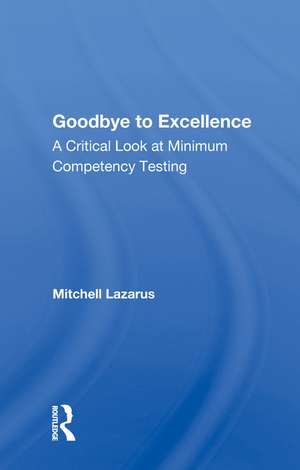Goodbye To Excellence: A Critical Look At Minimum Competency Testing
Autor Mitchell Lazarusen Limba Engleză Hardback – 7 iun 2019
Preț: 764.20 lei
Preț vechi: 1027.43 lei
-26% Nou
Puncte Express: 1146
Preț estimativ în valută:
146.22€ • 152.69$ • 120.75£
146.22€ • 152.69$ • 120.75£
Carte tipărită la comandă
Livrare economică 16-30 aprilie
Preluare comenzi: 021 569.72.76
Specificații
ISBN-13: 9780367021764
ISBN-10: 0367021765
Pagini: 222
Dimensiuni: 146 x 229 x 19 mm
Greutate: 0.45 kg
Ediția:1
Editura: Taylor & Francis
Colecția Routledge
Locul publicării:Oxford, United Kingdom
ISBN-10: 0367021765
Pagini: 222
Dimensiuni: 146 x 229 x 19 mm
Greutate: 0.45 kg
Ediția:1
Editura: Taylor & Francis
Colecția Routledge
Locul publicării:Oxford, United Kingdom
Cuprins
Also of Interest -- Foreword -- Preface -- Why Minimum Competency Testing? -- The Technology of Testing -- Setting Standards for Minimum Competency -- Effects of Minimum Competency Testing on Curriculum -- Competency Testing of Minority and Handicapped Students -- Legal Background of Minimum Competency Testing -- The Case of Debra P. -- Goodbye to Excellence
Descriere
In recent years, concern over high school graduates who could not balance checkbooks or read directions has led many states to require students to pass minimum competency tests before receiving their diplomas. This, legislators believe, will again make diplomas meaningful, as well as promote better education. Dr. Lazarus points out that any testing scheme creates inequities and that these tests are of special concern due to the emphasis society places on high school graduation; a just society cannot accept their potential to mark a student for life. The problem, he believes, is that society cannot agree on the goals of education, making relevant testing difficult. He also questions whether such testing will produce better curricula and notes that, while more emphasis on the basics may be needed, undue stress on them may weaken other parts of the curricula. He concludes that the goals of minimum competency testing are laudable, but that implementation may do long-term damage to education.
